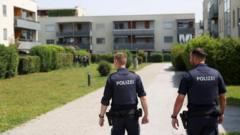Following a secret vote by local officials, the council of Braunau am Inn has decided to rename two streets named after Nazi supporters, marking a notable change in how Austria confronts its historical associations with Nazism. This decision aligns with ongoing efforts by advocacy groups to rectify the legacy of past atrocities.
Austria Announces Renaming of Streets Linked to Nazi Affiliates

Austria Announces Renaming of Streets Linked to Nazi Affiliates
Two streets in Braunau am Inn are set to be renamed, marking a significant shift in Austria's approach to its Nazi past.
Two streets in Braunau am Inn, Austria, the hometown of Adolf Hitler, will be renamed after persistent advocacy highlighting their links to Nazi supporters. The local council's decision, made through a secret vote, comes following a report asserting that retaining the street names is unconstitutional. Notably, the streets currently honor composer Josef Reiter and entertainer Franz Resl, both members of the Nazi Party.
The renaming will affect around 200 households, changing their addresses as part of a broader reevaluation of Austria’s historical narrative concerning World War II. Historians have long critiqued the Austrian government's approach to its past, often portraying the nation as a victim rather than recognizing its significant role in the events of the war.
The Mauthausen Committee has lauded the decision, calling it a "decision with symbolic significance." This organization represents the memories of the nearly 90,000 prisoners who perished at the Mauthausen concentration camp between 1938 and 1945. Committee chairman Willi Mernyi expressed gratitude to allies who supported their campaign for change.
As part of this initiative, the committee proposed new street names to honor Austrians who resisted the Nazis, such as former deputy mayor Lea Olczak and Maria Stromberger, a head nurse who contributed to the resistance at Auschwitz.
Austria has previously renamed streets associated with Nazism, illustrating a gradual shift in addressing its historical complicity. However, many such names remain, highlighting the complexity of reconciling with a painful past. The Holocaust saw around 65,000 Austrian Jews murdered, along with millions of others targeted by the Nazi regime, underscoring the urgent need for remembrance and accountability in the wake of historical injustices.






















